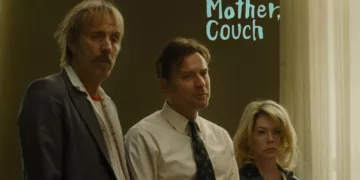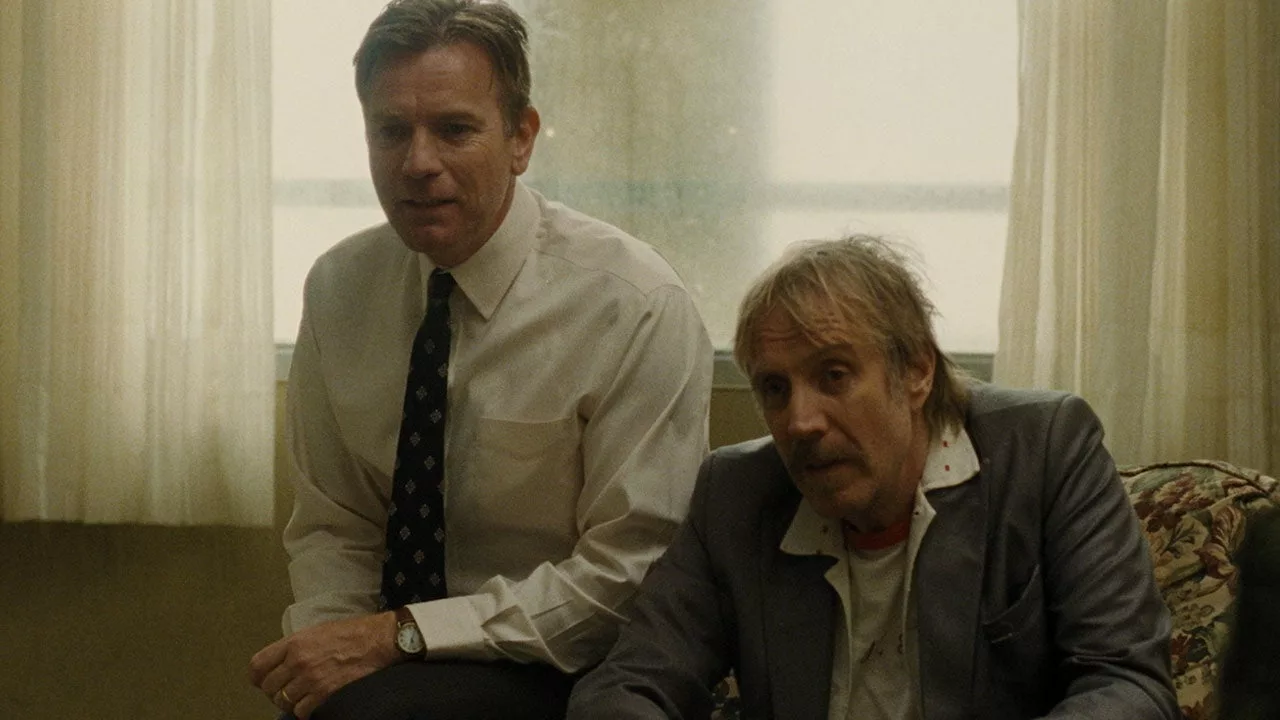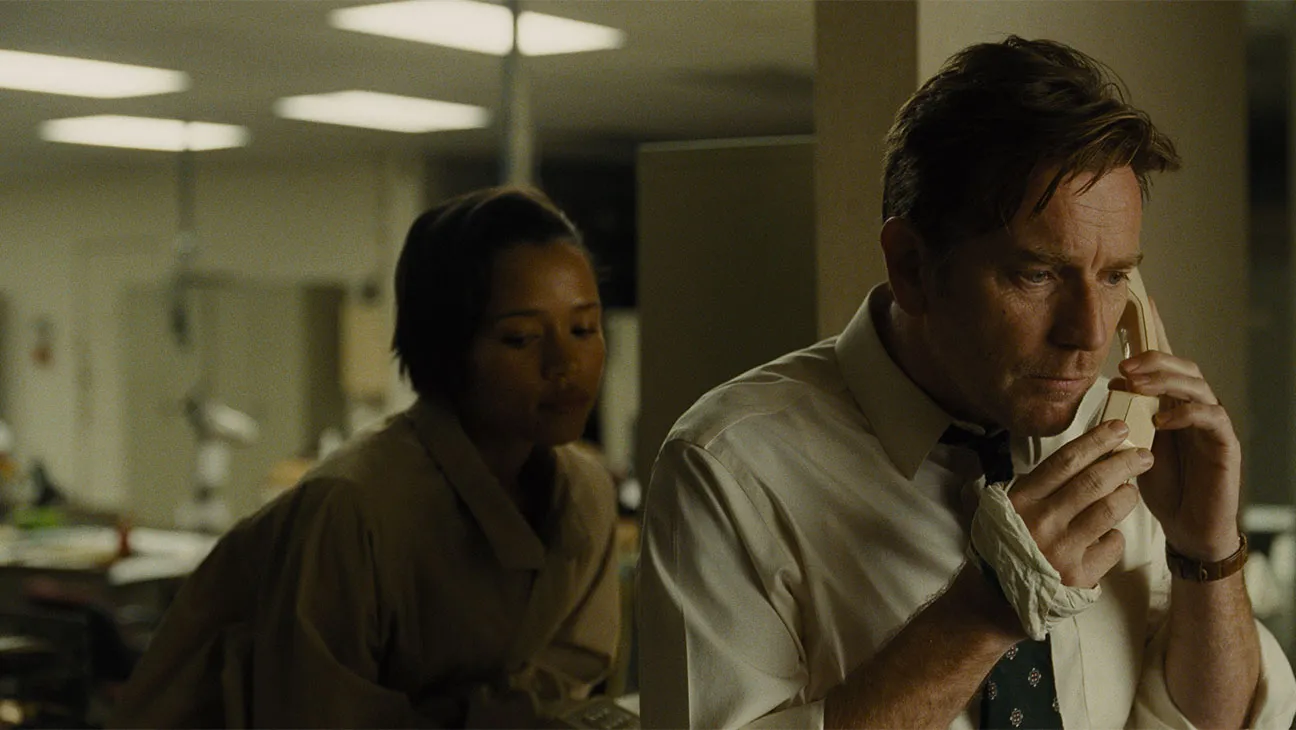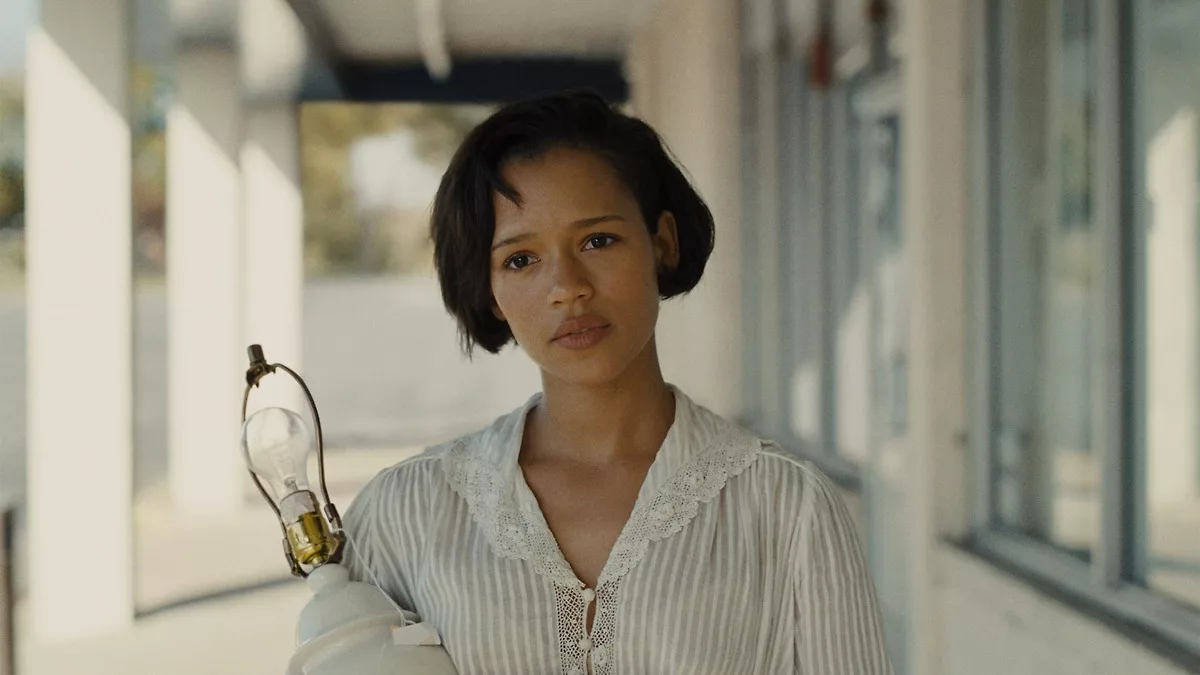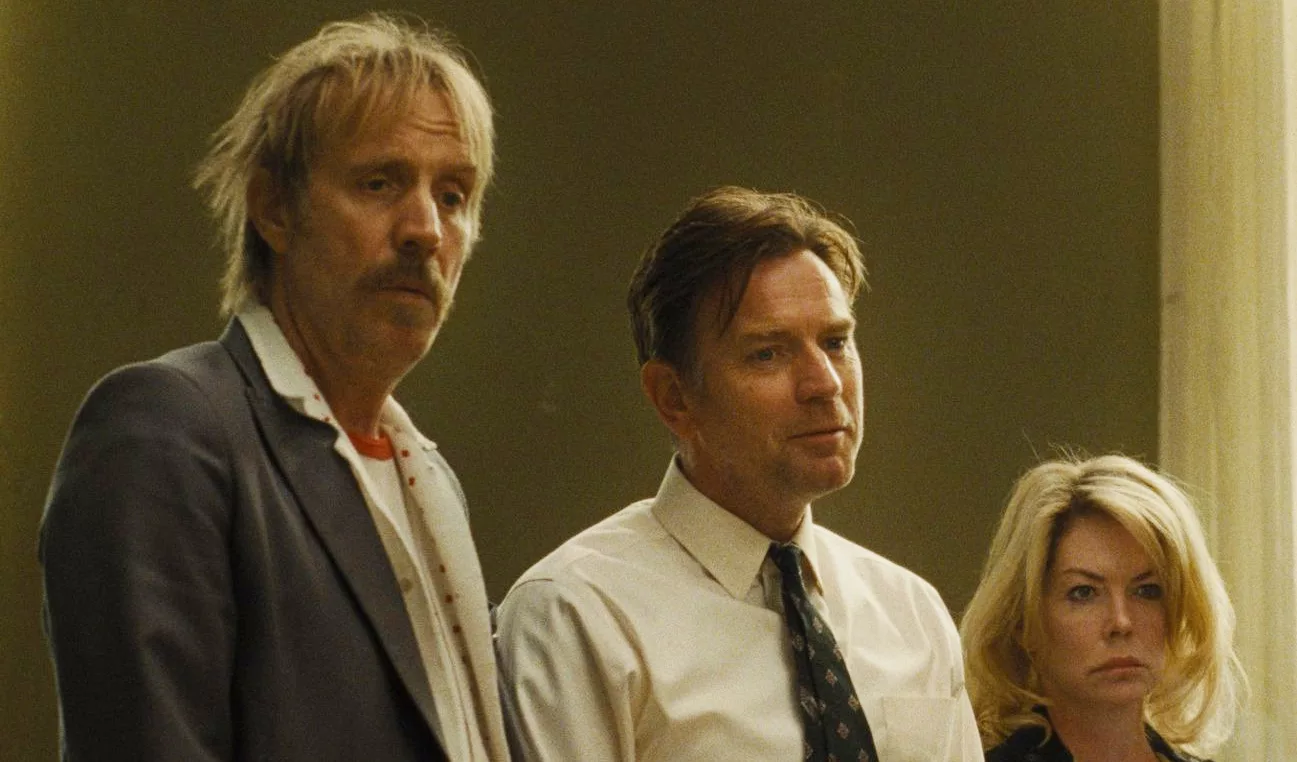Niclas Larsson’s debut feature, Mother, Couch, tells the story of a family brought back together under peculiar circumstances. Veteran actress Ellen Burstyn stars as the mother at the center of it all, who has inexplicably planted herself on a couch in a local furniture store and refuses to budge. Her three estranged children—played by Ewan McGregor, Rhys Ifans, and Lara Flynn Boyle—are called in to try and persuade her to leave.
Under the unusual setup lie deeper themes of fractured family relationships and the intergenerational trauma that can stem from troubled childhoods. Burstyn portrays a mother who never wanted her own children and makes no effort to hide her resentment towards them. This has lasting effects we see play out, such as in McGregor’s character struggling to meet the expectations of both his mother and his own wife and kids.
The story shifts between dramatic scenes of the family confronting painful truths and more surreal turns the narrative takes. This approach presents challenges, as balancing these differing tones grows tricky and, at times, works against crafting a cohesive story. While the actors’ performances remain a strength, bringing nuance to even the most dysfunctional of relationships, the film ultimately struggles to hold its themes and narrative together in a completely satisfying way.
Strong Performances Anchor Surreal Family Drama
At the heart of Niclas Larsson’s directorial debut, Mother, Couch are two powerhouse performances from veterans Ellen Burstyn and Ewan McGregor. They breathe life into the complex characters at the center of the film’s strange yet moving story.
Burstyn is a wonder, as is the matriarch refusing to leave her seat on a store couch. There’s an icy façade hiding layers of pain, which she reveals in tantalizing glimpses. When emotions finally erupt, Burstyn is a force, conveying lifetimes of torment with just a glance. Her shadow looms large over the narrative, a testament to Burstyn’s skills.
As her beleaguered son David, McGregor navigates treacherous waters with nuance. He depicts a man wrestling control from the strings of his mother’s influence while having doubts about his own parenting. McGregor unveils troubled depths through small gestures, bringing a three-dimensional humanity to what could have been a stock role. Watching his character unravel at the seams is deeply unsettling, all credit to McGregor’s unflinching commitment.
Supporting turns are also standouts. Ifans brings humor and heart to playing David’s wayward brother. Flynn Boyle is a hoot as the acerbic sister; her bitter quips are a welcome foil. And Russell shines in multiple layers as an ethereal guide through the film’s bewildering events.
Even amidst Mother, Couch’s surreal stretches, these performances anchor the narrative, imbuing fantastical elements with emotional authenticity. They elevate Larsson’s debut, proving that strong casting is key to any film’s success, no matter how unconventional.
Character Development
Niclas Larsson’s direction guides compelling character arcs in Mother, Couch. Ewan McGregor subtly shows David straining to keep his family together as tensions rise. Remaining calm despite frustration, David suppresses his own needs. As struggles mount, cracks emerge in his steady façade.
Larsson peels back David’s layers through thoughtful interactions. Discussions with his quiet yet manipulative mother, played memorably by Ellen Burstyn, chip away at David’s composure. Burstyn hints at past traumas, intensifying David’s guilt and pressing past restraints. McGregor embodies David’s unraveling resilience, revealing bottled emotions in explosive outbursts.
David’s siblings portray differing ties to their mother. Lara Flynn Boyle plays Linda as dismissive, smothering care with cigarettes. Seeking distance, Linda overlooks others’ wellbeing. Rhys Ifans portrays Gruffudd’s nonchalance, masking unease with responsibility. Hiding behind carelessness, Gruffudd shuns problems. Their interactions expose wounded relations beneath superficial traits.
More development of supporting characters could have enriched the piece. Taylor Russell shines as a steady presence, Bella. Yet her character remains peripheral, with mysteries left unexplored. David’s family received less examination too, being sidelined as David’s focus shifts.
While surreal elements overtake the ending, Mother, Couch sees characters evolve from initial impressions through riveting performances. Larsson guides talented actors in crafting flawed yet stirring portraits of family dynamics straining under the accumulated weight of past misfortunes.
Mother, Couch: A Director’s Deft Touch
Niclas Larsson demonstrates directing flair in his handling of Mother, Couch. He navigates deftly between dramatic realism and moments of surrealism, keeping viewers constantly engaged even when the story becomes unpredictable.
Larsson uses the furniture store, Oakwoods, to great effect. It’s more than just a setting; the store takes on life as a character in its own right. Cinematographer Chayse Irvin films its crowded showrooms and cluttered halls with a clever, roving eye. Warm sepia tones envelop every scene, setting a melancholic mood that reflects the troubled emotions within. Irvin’s camera seems to discover something new in each piece of creaking wooden furniture.
This decaying retail space comes to represent the fractured state of the family. Its haphazard organization is mirrored in the disarrayed relationships between Mother, David, and his siblings. Their shifting dynamics play out amidst oak armoires and sofa suites, with Larsson drawing parallels between characters and their surroundings.
Christopher Bear’s unsettling jazz score also enhances the atmosphere, capturing emotional undercurrents. His jazz cues take on a brooding, unsettling edge during intense exchanges. The music plunges the audience into David’s inner turmoil.
While maintaining suspense, Larsson ensures the acting remains front and center. He coaxes conflict and nuance from every line delivery, particularly between Ellen Burstyn and Ewan McGregor’s charged scenes. Their confrontations are given gravity and grit through his guidance.
In the surreal later stages, the director balances absurd visuals and narrative gaps skillfully. However, some shifts in style may disrupt flow for some. Overall, though, in his debut, Larsson shows a visionary touch and flair for visual storytelling that will serve him well in future projects.
Mother’s Stubborn Stay Sparks Family Drama
When Ellen Burstyn’s character plants herself on a couch in the Oakwoods furniture store, refusing to budge, it sets in motion an unusually dramatic scenario. Her three grown children—DDavid, played by Ewan McGregor; Gruffudd with Rhys Ifans; and Linda with Lara Flynn Boyle—mmust all come together to try to resolve the peculiar situation. David, feeling responsible as the youngest, takes the lead in efforts to reason with their mother.
As tensions rise over why she’s insistent on staying put, buried family issues start to surface. Flashbacks and heated discussions reveal lingering pains from their childhood—aa neglectful mother, an absent father in each of their lives, and resulting feelings of abandonment. Burstyn portrays a woman rigid in her independence yet still able to wield power over her offspring with subtle manipulation. The siblings each grapple with her influence in their own way, whether through distance, defiance, or desperate pleas for approval.
Director Niclas Larsson builds an unsettling tone as the surreal scenario brings these interpersonal conflicts to the fore. Yet some found the narrative too oblique, failing to develop the family drama and characters to their fullest potential. While the actors commit fully to their roles, particularly Burstyn and McGregor, some note the film would benefit from greater exploration of what shapes this dysfunctional dynamic and what really drives the mother’s strange actions. As entertaining as the absurd premise is, clearing away some of the distracting mystery could strengthen the emotional core of this tale of troubles woven through the bonds of blood.
Mother, Couch’s Storytelling Balance
While Mother, Couch assembles a stellar cast who bring nuanced performances, the film would have benefited from a sharper focus on its central family relationships. In particular, the first half moves at an uneven pace as it diligently sets the situation yet risks losing some viewers’ interest.
Larsson takes risks with surreal elements that don’t always land as intended. The dreamlike finale, revealing the story was a figment, undercuts the realistic emotional core carefully developed until then. We’ve followed McGregor’s character through raw familial strife and his fractured bond with his difficult mother, played to chilling perfection by Burstyn. To suddenly pull back the curtain removes us from sharing his catharsis.
More clarity highlighting the family’s dynamics could have strengthened what’s perhaps the true heart of the film. We get intriguing glimpses of their history, yet more exploration was warranted given their obvious brokenness. A sharper editorial hand may have reined elements, keeping this priority at the forefront.
Ultimately, while ambitious in merging genres, the film wavered in maintaining a balance between realism and surrealism, risking muddying its emotional throughline. With refinement of focus and pacing, particularly around fully fleshing the family at its center, Mother, Couch could have sustained its poignant impact even after revealing its story was a fable. The talent involved showed there’s potential here that tighter storytelling could have more fully realized.
Mother, Couch’s Ambitious Effort
While Mother, Couch showed flashes of brilliance, it ultimately didn’t fully deliver on its ambitious premise. You couldn’t fault the fantastic cast, as they gave it their all despite some of the story’s missteps. Ewan McGregor in particular was captivating as the son struggling under the weight of his mother’s strange demands. You really felt for his character’s plight.
Ellen Burstyn, too, was phenomenal as the source of so much mystery and family tension. Her face could convey volumes without saying a word. The dynamic she established with McGregor felt genuine. Hopefully they’ll team up again where the material better suits their talents.
Even in smaller roles, the performances impressed. Taylor Russell was a soothing but unnerving presence. And Rhys Ifans brought humor that lightened things just when needed. You could see why this talented group signed on.
Sadly, where the film fell short was in clarifying its surreal touches. Cool ideas went intriguingly unexplained. The ending resolution also felt too pat. By then, I wanted to understand the mother’s motivations more fully and see the characters’ arcs pay off in a more satisfying way.
Still, Niclas Larsson shows promise as a director capable of coaxing out the best from actors. With a tighter script attuned to the fuller character depths hinted at, his potential could really shine. As it stands, Mother, Couch remains an interesting misstep that still engages more than it frustrates. I hope Larsson’s next feature can stick to the landing as admirably as this cast committed to the role.
The Review
Mother, Couch
While Mother, Couch assembled an impressive cast who gave it their all, some uneven storytelling held it back from fully delivering on its intriguing, surreal premise. Niclas Larsson demonstrated directing skills that show he could excel with stronger material attuned to character depth. As it stands, this remains an ambitious, if ultimately flawed, film that engaged more than satisfied.
PROS
- Strong central performances from Ewan McGregor and Ellen Burstyn
- Intriguing surreal premise with comedic and dramatic elements
- Director Niclas Larsson shows promise in his debut.
CONS
- Uneven pacing and narrative clarity detract from potential.
- Underdeveloped characters and story resolution
- Surreal elements left unexplained
